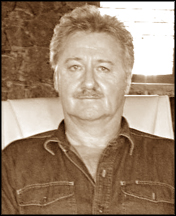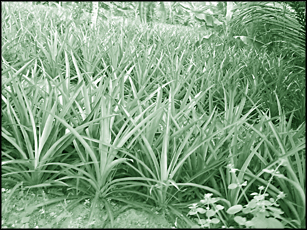Organic farming: the way forward
by Asangi JAYASINGHE
Fifteen years ago Thomas Gerbracht and his young family from Germany
visited Sri Lanka as tourists. He was then a successful entrepreneur who
owned dining restaurants and discotheques in Germany. The moment he set
eyes on this beautiful paradise island, he fell in love with this
country and its people.
 |
|
Thomas Gerbracht |
He sold his business in Germany and bought an estate in Sri Lanka and
started cultivating fruits, mainly pineapple, papaya, passion-fruit and
coconut, without the use of agrochemicals in his estate. From humble
beginnings, his Sri Lanka-based organic food business has today grown in
to one of the biggest in Asia. His company, Target Agriculture Pvt. Ltd.
is a $10-million-a-year company that employs more than 300 people and
buys organic fruits from thousands of farmers throughout Sri Lanka and
export them to Europe, US and other countries in Asia. He lives in his
picturesque estate in Weligama and in the aftermath of the tsunami in
2004, helped his community in numerous ways.
The `Sunday Observerí spoke to Thomas Gerbracht about his passion for
organic farming and his working and living experiences in beautiful Sri
Lanka.
Q: You were born in Germany and had a successful business there. What
made you settle down in Sri Lanka with your family?
A: Well, when I first came to Sri Lanka in the early 80s as a
tourist, I had the tropical smell in my nose and I saw all the smiling
people here. I said this is the place where I want to live. I wanted to
live in a place where I could feel free and less stressed.
Q: There was a war in Sri Lanka at the time. Most foreigners were
afraid to come to this country and were advised by their authorities to
stay away from Sri Lanka when LTTE attacks were frequent. Werenít you
afraid to come and live with your family in a country about which there
was so much negative propaganda in the world?
A: Wars are taking place in many countries in the world, and even
where there arenít, if you are at the wrong place at the wrong time, you
can still be affected. I never had a reason to be afraid or scared in
Sri Lanka, but I am also happy, that the war is now finally over.
Q: How did you first get involved in organic farming?
A: I got a small plot of land from my grandfather, when I was 5. I
planted strawberries and flowers there and sold them to my neighbours. I
started in Sri Lanka, in my estate, planting passion-fruit and pineapple
by myself. I used cow dung and compost as manure and I gained the
required knowledge by studying books. The books confirmed that what I
was doing instinctively was right in fact.
Q: How did your organic food business become one of the biggest in
Asia?
A: When I first came here, I never thought of a huge export business.
Initially, I cultivated fruits and vegetables employing natural way
methods, without using chemicals. I wanted to sell the surplus at the
local market. So I started as an organic farmer. Then I sent some
samples to a well-known fruit juice company in my home country, Germany
and they asked me how many containers I am able to supply. I immediately
started involving local farmers in the venture and asked some factories,
if they can do some processing for me. Thatís how I exported my first
container. Now we are working with many factories and farmers in Sri
Lanka, Malaysia and Thailand and export more than 200 containers per
year. I am glad that my organic food business has provided many
employment opportunities and also an opportunity for the farmers to
learn how to protect their environment.
Q: What are the cultivation methods used in your organic farms?
 A: The concept and the philosophy of Target Agriculture Pvt Ltd. are
to avoid everything which damages the soil, the environment, animals,
human nature and our earth. Every tree, that we cut, every weedicide or
chemical that we use, every hormone causes harm to us and our nature. A: The concept and the philosophy of Target Agriculture Pvt Ltd. are
to avoid everything which damages the soil, the environment, animals,
human nature and our earth. Every tree, that we cut, every weedicide or
chemical that we use, every hormone causes harm to us and our nature.
Our motto is mulching. This means giving organic material back to the
soil and to the plant. Damaged soil needs up to 12 years to recover. We
introduce micro-organisms to our soils, which reactivate the soil life.
We plant leguminous plants around our fruit plants to collect
Nitrogen from the air and give it via rhizomes to the soil. We add fish
waste, bones, ash, cement and cotton to our compost so that it reaches
the necessary levels of Nitrogen, Potassium, Phosphorus and trace
elements.
Ducks, chicken and cows are used to control weeds and pests. We use
pheromones to control beetle attacks; ladybirds to control mealy bugs;
Na leaves against termite attacks; several species of ayurvedic and
herbal oil extracts; and bacillus thuringensis to keep caterpillars
under control. Khomba nuts, sapodilla and anoda (soursop) seeds are also
effectively used against various pest attacks. If all else has failed,
we spray pyrethrum, a natural insecticide made with the chrysanthemum
flower. This is our natural way to deal with pests, diseases and such
disorders.
Apart from our own plantations, the company has an outgrowers Network
of more than 1,500 contract farmers on about 15,000 acres of organic
cultivated and certified land. We organise regular training seminars for
them and show them how to make compost, how to treat diseases with
natural methods and organise the collection and transport of their
harvest to one of our own or contract factories.
Q: You work with 1,500 farmers throughout the country and have
travelled widely in this country. What differences do you see in Sri
Lanka and Germany?
A: Sri Lankan people are very friendly and helpful and have more
relaxed attitudes. German people are also very friendly, but life there
is very fast paced. Here I had to learn to be a little more patient.
Q: Today you are a successful businessman in this country. In which
areas do you think Sri Lanka needs to improve so that the country can
attract more foreign investors like you?
A: It is never easy to be successful and it is even more difficult to
stay on top. You are always under pressure and you can never really
relax. I had to combine both the Lankan and German mentalities to do my
business successfully. Sri Lanka is one of the few countries, where a
foreigner can gain 100 per cent ownership in a venture; that is quite
good. On the other hand, we do not have enough cultivation here and the
supply of agricultural products is also carried out in a more lethargic
manner than in other emerging countries like Thailand or India. We also
have a raw material problem and the prices are too high compared with
other countries. So we will gradually lose our market to others, if we
do not change this. We should initiate measures to promote cultivation
so that is also to benefits the poor farmers in remote areas.
Q: A lot of people in this country migrate to other countries. You
are a person who left a developed country and came to this island and
did well. Young village people are not into farming anymore. What advice
can you give entrepreneurs and young people living in villages in Sri
Lanka?
A: Farming and producing food is the most important job for the
sustainability of our society. If everything leaves their country or
moves out of their villages, who can feed the people? Land and soil are
most valuable. Sri Lanka has a very fertile soil. You just put a stick
in it and a tree will grow. The young villagers should consider the
potential which they have, before they decide to leave their villages.
Q: The war with the LTTE is over now. You once started organic
farming in the North and East, but could not continue due to the war.
Are you planning to re-start organic farming in the North and East now
that these areas are liberated?
A: Well, my dream was to carry out cultivation in cooperation with
all communities in all parts of the island. We have distributed planting
material and hold seminars in all parts of the country to promote
organic farming and provide a market for the crop. But in Sri Lanka, you
must start 10 projects to make two or three successful. It would be too
easy if everything works out. So we have to expand into other countries.
But we are still looking for bigger supplies of fruits, especially
pineapple.
|

